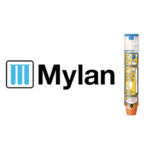 Mylan Pharmaceuticals‘ (NSDQ:MYL) 500% price increase on its epinephrine auto-injector cost the U.S Defense Dept. millions, according to data provided to Reuters.
Mylan Pharmaceuticals‘ (NSDQ:MYL) 500% price increase on its epinephrine auto-injector cost the U.S Defense Dept. millions, according to data provided to Reuters.
The Pentagon spent $57 million on Mylan’s EpiPen last year, up from $9 million in 2008, largely driven by volume and price hikes that affected prescriptions filled at retail pharmacies. Although the Pentagon gets a government discount for EpiPens from military treatment facilities and by mail order, nearly half of its spending was at retail pharmacies. Recently, it paid an average of $528 for a two-pack of the lifesaving allergy treatment. That’s 3 times higher than the discounted rate, according to the news service.
Mylan and the Pentagon are discussing an extension to the military discount for EpiPens to include retail pharmacies through rebates. Reuters estimated that the agency paid $54 million more than what it would have if it had filled the prescriptions at military clinics from 2009 through 2016.
Mylan has been under fire since August, when reports revealed the company jacked the price of the EpiPen device, despite stable manufacturing costs. CEO Heather Bresch testified before Congress about the company’s pricing strategies, although many politicians questioned whether she was honest about the company’s data.
The Centers for Medicare & Medicaid Services said last month that the company has been overcharging Medicaid for its EpiPen auto-injector for years, despite being warned that it should have paid bigger rebates. CMS said that between 2011 and 2015, Medicaid spent $797 million on the epinephrine auto-injector after deducting rebates, marking the 1st time the federal agency has revealed how much it spent on the device. CMS revealed last week that Mylan misclassified the device as a generic, allowing the company to pay a 13% rebate instead of the 23% allocated for brand-name products.
This misclassification also hurt the Defense Dept. and the Veterans Affairs Dept., which typically pay low drug prices because of discounts mandated by law. The discounts are largely determined whether the drug is patent protected or is a generic.
Because Mylan classified the EpiPen as generic, it didn’t have to pay a rebate to the Defense Dept. Mylan has documentation it said shows the military accepted its generic classification in 2008, according to Reuters.
Mylan shelled out $465 million to settle the Medicaid claims and said it would reclassify EpiPen as a branded drug. Medicaid will receive a 23% rebate, instead of the 13% it gets on generics and any price hikes will be capped at the inflation rate – a protection that is not provided for generic drug purchases.
“It was always our intention that the reclassification would benefit all government agencies impacted by the classification, including the VA and Tricare (Defense) programs,” Mylan spokeswoman Nina Devlin told the news service.

